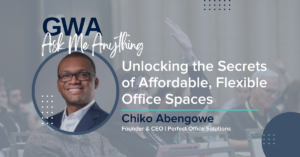William Edmundson, Chief Operating Officer for Office Evolution, said his key to growing a coworking chain of 60 open locations (with 25 more set to open this year) is hospitality.
“I’ve got service and operations in my blood,” he said. “I grew up in hospitality,” he explained. His career includes leadership positions with Hilton, Hampton and Embassy Suites brands, and launching Choice Hotels, Cambria Suites brand before he made his way into coworking.
Edmundson took a brief break to work as a consultant before being recruited to rebrand and improve a chain of executive suites, Abby Executive Suites, in Houston. Edmundson’s rebranding plan quickly expanded Abby from 17 to 25 locations and garnered triple digit increases for the company. Eventually, Abby’s performance led to a successful sale to Regus.
Rebranding a Culture
For Edmundson, the move from hospitality into shared office space was a natural one. “All the keys to success I learned in the hospitality industry was a direct translation into this industry,” he explained.
While he made many changes as part of the rebrand for Abby Executive Suites, Edmundson’s areas of focus were the same as when he was in the hotel business: build culture, drive profitability, and take care of your customers.
For Edmundson, a culture of hospitality means both customer service and supportive culture for the team—and it’s this hospitality that often drives profitability.
“If we’re hospitable, we take care of our clients and we provide them with more plans and services than they’ve had in the past, then we’re going to get those clients, and they’re going to stay,” he said, explaining that his current work with Office Evolution revolves around a model that prioritizes the flexibility of office space options for their clients.
“With more choices, you really have to be hospitable,” he said.
He pointed out that coworking as an industry used to offer far more limited plan options to clients—perhaps a mail-only plan or a plan that ended up being far too expansive for many clients. As the industry has shifted to encompass different clients who are often more mobile, however, Edmundson said successful spaces are always thinking: “Give people what they want and take care of them.”
That line of thinking is driving a whole host of new options within spaces that match the customer-centric model of the hospitality industry.
Listening to Customers
Office Evolution, the fourth-largest coworking organization and the fastest growing coworking franchise in the nation according to number of spaces open, functions on a franchise model. Office Evolution Business Centers are independently owned by Office Evolution franchisees. Edmundson explained that this model allows franchisees to communicate directly with all their customers. This means that Office Evolution is very close to their customers and can react quickly to their need on everything from décor to technology, such as the use of Greetly at the front desk (which Edmundson said clients really enjoy).
“We get feedback quicker than most and are equipped to act quickly,” Edmundson said.
Office Evolution monitors a variety of KPIs in an effort to understand what clients like, what they don’t like, and how different features interact to create a more successful client experience. Edmundson explained that this tracking is critical for both client retention and for scaling the business.
Network for Coworking
The one thing Edmundson said he was missing when he moved into coworking was a network, which is why the Global Workspace Association has been so important to him.
Chris Brown of Abby Executive Suites introduced Edmundson to a network of peers through the GWA conventions. “He was able to introduce me to all his friends and contacts in the industry, which was a tremendous head start for a guy who was new to the industry,” Edmundson said. “That really helped me hit the ground running a lot faster.”
He went on to explain that the connections with professionals in coworking and related industries, including vendors, have been critical to his success.
“I’ve always found that people in this industry are very friendly and willing to help each other,” he said.
In the last several years, the coworking industry has grown from a “mom and pop industry” to something bigger, but Edmundson said it still largely functions on relationships and shared knowledge among experts. While the webinars, conventions, and other educational materials from the GWA have been helpful, Edmundson said the network is what he uses most.
“The networking has just always been such a big part of it,” he said. “I don’t think twice about picking up the phone and calling one of my friends from the GWA or having them call me, just to bounce ideas off each other.”
In his work with the GWA, including two terms as a board member, he said watching the network expand to include not just shared space operators but also industries that add value to shared workspaces, such as service providers, brokerage companies, etc., has been exciting to him.
“I think as our industry changes and more people get into the industry from different backgrounds, whether it be landlords or building owners or brokerage companies, we need to be aware of what’s going on,” he said.
Edmundson also noted that the willingness to share knowledge in the coworking industry has carried over to his work with the GWA as well, where he and his fellow board members have been able to get involved and reinvest their time back into the industry.
“I really enjoy working with the other board members. I think it’s important to be in an industry where we can work together and share ideas,” he said.




